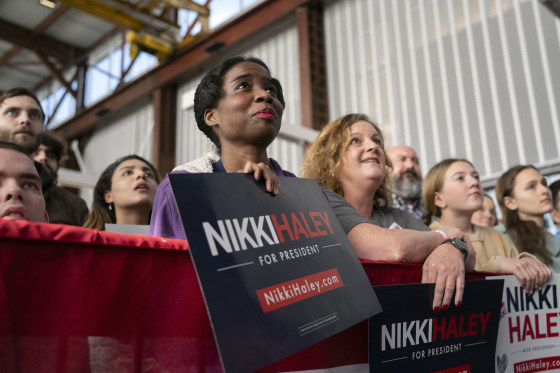Now that former South Carolina Gov. Nikki Haley is officially ending her bid for the Republican presidential nomination, some millions of voters have a decision to make. Much of their opposition to Donald Trump has been largely about the former president’s fitness, not his policies. Haley gave voice to these reservations, accusing Trump of igniting national chaos, questioning his age and bluntly warning that the nation could not survive a second Trump presidency. She declared Trump mean, unstable, unhinged and offensive. She called his false election 2020 conspiracies those of a loser; denounced his "disgusting" comments on race; and accused him of preferring Vladimir Putin over our allies in freedom.
Trump has vanquished Haley handily, defeating her in every state where she contested the former president.
Now Trump has vanquished Haley handily, defeating her in almost every state where she contested the former president. Certainly, he expects to unite the Republican Party behind his all-but-assured November rematch with President Joe Biden. But Haley’s defeat has not suddenly made Trump any more fit to serve, nor does her still likely (but not apparently imminent) endorsement of the twice-impeached former president who faces a criminal indictment for conspiring to defraud the electorate of its previous presidential vote.
So what does a Haley voter do in November?
Haley herself routinely equivocated on the campaign trail, gratuitously calling Biden more dangerous than Trump. Her accusations against Biden, however, never seriously cast him as an existential threat to American democracy. She challenged Biden instead on his age and competency, awkwardly painting his policies on issues such as immigration and taxes as failures. And yet Haley’s reservations about Biden’s politics always paled in comparison to her vicious, existential charges against Trump — and her voters understand that.
So do Haley voters indeed turn to Biden? Polls remain mixed. Some consistently indicate a plurality of Haley voters would vote for Biden, with one leading survey showing fully two-thirds of Haley’s Iowa voters and three-fourths of her New Hampshire voters would reject Trump outright. Still other polls suggest that Republican and Republican-leaning voters’ perception of Biden is so toxic and negative that ultimately many Haley voters will either return home to Trump, choose an alternative — or simply will not vote in the presidential contest.

Their collective decision could decide the fate of the presidency and the future of American democracy. With the stakes so high, that decision now demands intellectual honesty from every Haley voter.
Biden has presided over an economy that continues to set records, he has restored U.S. leadership to a western alliance confronting dictators and autocracy worldwide, and he has brought the nation home to more sober conversations about personal liberty and hard questions of race, gender and equity. More people will go to work tomorrow than ever before. The stock market is at an all-time high. Home ownership remains at historic levels, and quality education and affordable health care are accessible to most American families.
And on the pressing issue of border security, the Biden Administration responsibly addressed the crisis with an aggressive legislative package, negotiated between Republicans and Democrats in the Senate — only to have Trump demand fealty from congressional Republicans, who stonewalled it.
Is that Joe Biden really the danger that Haley suggests? Or do Haley voters see through her election-year partisanship, and will they instead act on their shared worry that the nation may not survive another four years of an unhinged, unstable, chaotic Donald Trump?
Haley’s aggressive primary challenge did not remedy Trump’s lack of fitness for office — but her campaign did help to expose it to Republican voters. That realization brought many Republican voters into Haley’s camp, and that same conviction should lead them to support Biden in November.
This potential coalition of Haley-Biden voters could indeed decide this election. Few political movements could claim such impact. The former South Carolina governor may not choose to claim that as part of her political legacy, but her voters can make it part of theirs.
